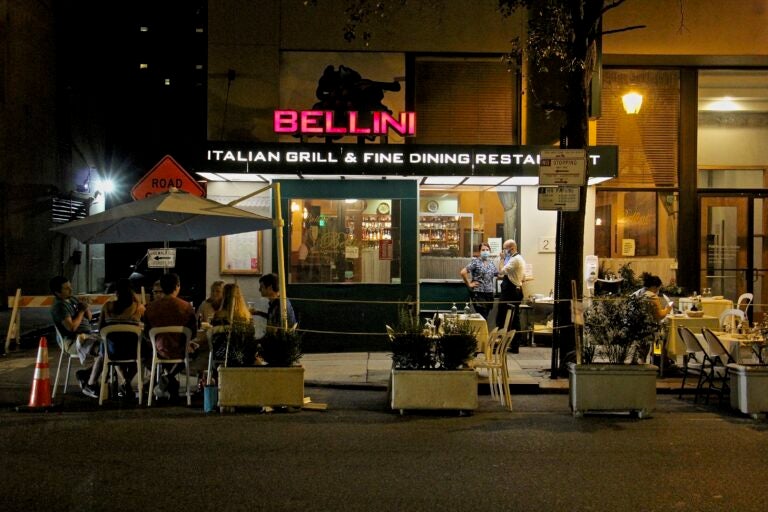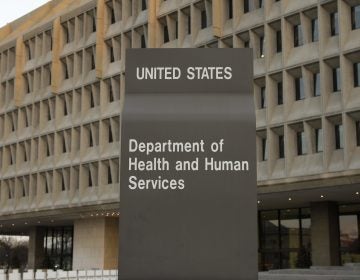Inside Philly’s new COVID-19 restrictions
Coronavirus is surging in Philly, and asking people to distance isn't stopping the spread — so the city is entering a new phase of life in lockdown
Listen 18:25
A restaurant on 16th Street in Center City uses the street for outdoor dining. (Emma Lee/WHYY)
As COVID cases soar, Philadelphia is unrolling a new round of restrictions: no more indoor dining at restaurants, and gyms and movie theaters must close. City officials have asked people to stop visiting with friends and extended family indoors. The move came after Mayor Jim Kenney tried to ease the city back open and even increased indoor capacity at restaurants as cases were rising to bolster the economy. As businesses reopened their doors, city officials pressed residents to take personal responsibility, repeatedly encouraging them to wear a mask, wash their hands, and stay six feet apart from others.
WHYY health reporter Nina Feldman explains why Philadelphia is changing its course.

Hear the whole story on The Why
Interview highlights
Nina Feldman on the new surge of COVID infections
It’s getting pretty bad. As of today, there are more than 55,000 positive cases in Philadelphia to date, and we are seeing evidence of the cases becoming more severe than they have been over the summer or in recent months. In just the past couple of weeks, the hospitalizations have more than doubled, and deaths, while increasing at a slower rate than the cases of the hospitalizations, are starting to creep up. We heard today from the Health Commissioner that there have been eight new deaths over the weekend, and that’s definitely a higher number and a higher rate of increase than we’ve seen in a long time.
A breakdown of the latest restrictions
For at least the next six weeks and maybe more, indoor gatherings of any size will be prohibited. That’s because evidence shows that places, where people are inside without masks are where the virus spreads. So gyms will be closed, museums, libraries, theaters, no more indoor dining at all. We had increased indoor dining capacity up to 50% in Philadelphia. That will end. No private gatherings with people outside of your household. Even just having a neighbor or friend over for dinner is prohibited based on these new rules. Outdoor dining is allowed, but a maximum of four people per table, and you aren’t supposed to eat with anybody outside of your own household. So, obviously, if you had a six-person household, they would make an exception for that. But the idea with putting that number four in place is to say we’re not mixing households.
All other outdoor gatherings would be limited to 10% of capacity, and no food allowed. [Philadelphia Health Commissioner] Farley specified that means no more fans at football games, work from home unless you absolutely can’t. That was sort of already true, but it had been kind of sliding away, I think. So everybody who can work from home should still be allowed. Stores will operate at a reduced capacity, and that’s five people per every 1,000 square feet, including employees, at a single time. It’s not a stay at home order, per se, but the city really, really is encouraging people to stay home as much as possible.
On why the city didn’t impose restrictions sooner
Restrictions have a big impact on businesses that are already struggling to stay open. So in the press conference on Monday, the health commissioner and the mayor both acknowledged a lot of people are going to be put out of work because of this.
The last time there was a lockdown, we had the federal Cares Act, which provided support for small businesses and larger businesses to help carry them through. And we don’t have that this time. You know, Mayor Jim Kenney said that he wanted to get the restrictions in place first to help save lives and not overwhelm hospitals. And then he would lobby in Harrisburg and in Washington later to try to get that funding coming down the pike to help people. But it’s not there now. And I think as the possibilities for a stimulus package seemed more and more remote in Washington, local officials kind of felt like their hands were tied and they wanted to put the restrictions in place, but they knew that without the support for their residents, they were going to be screwed. So it was kind of an impossible situation. And if you can’t pay people to stay home or pay businesses to stay closed, how can you expect them to survive and stick it out on the other end?
On how the restrictions will be enforced
That’s what the city means when they say to beat this pandemic, we all have to work together. It’s going to be hard to enforce this type of regulation that extends into somebody’s private home. So that’s where the personal responsibility does come in and everybody has to work together to get the case counts down and save lives.
WHYY is your source for fact-based, in-depth journalism and information. As a nonprofit organization, we rely on financial support from readers like you. Please give today.






